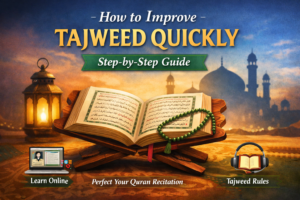Classical Arabic, the timeless language of the Quran, unlocks profound spiritual and cultural insights. This guide dives into its core fundamentals, offering methods to master this rich language through reading, speaking, and immersive practice. Whether deepening Quranic understanding or exploring ancient texts, mastering Classical Arabic bridges the gap between past and present, revealing the heart of Islamic heritage.
Classical Arabic has a very particular importance to the bodice of Arabic language as a whole and to the Holy Quran, which is revealed by Allah to us in Arabic.
“A Book whose verses have been detailed, an Arabic Quran for a people who know” (Fussilat-Verse 3).
“كِتَابٌ فُصِّلَتْ آيَاتُهُ قُرْآنًا عَرَبِيًّا لِّقَوْمٍ يَعْلَمُونَ” (فُصِّلت 3).
As the verse suggests, a deeper understanding of the Arabic language enhances comprehension of the Holy Quran’s meanings.
Since the Quran is written in Classical Arabic, this article will guide you through the Classical Arabic fundamentals, learning methods, the distinctions between Classical Arabic and Modern Standard Arabic, and more.
Table of Contents
What Is Classical Arabic?
Classical Arabic is the language of the Holy Quran. It was the common language of Arabs in the pre-Islamic era. So, this language was well understood by the Arabs during early Islam.
This makes both believers and non-believers captivated by the Quran’s eloquence and clarity, as they were renowned for their eloquence and rhetoric.
While Classical Arabic is not commonly spoken today, most Muslim Arabic speakers are familiar with it due to their study of the Quran.
What Are the Fundamentals of Classical Arabic:
Classical Arabic is the language of the Quran, classical Islamic texts, and many prestigious Arabic texts. It is a rich and complex language with a deep-rooted history and intricate grammar rules. The fundamentals of Classical Arabic include:
1. Alphabet and Phonetics:
Arabic is distinguished with a unique alphabet and phonetic system.
- Alphabet:
The Arabic alphabet consists of 28 letters, each with different forms based on their position in a word (أ،ب،ت،…..، ي)
- Diacritics:
The diacritics are marks to indicate the right pronunciation. They are: Damma( ُ ), Kasra ( ِ ), Fatha ( َ ).
2. Nouns:
In Arabic, a noun is referred to as “اسم” (ism). Nouns in Arabic are classified into various categories and possess several distinctive features:
- Gender:
The gender of nouns can be either masculine and feminine in the Arabic language.
- Number:
According to Arabic grammar, things can either be singular, dual, or plural.
- Definiteness:
In the Arabic grammar, nouns can be definite, for example with “الـ”, or indefinite.
3. Pronouns:
In Arabic, pronouns (الضمائر) are an essential part of speech used to replace nouns and refer to people or things. They come in different forms depending on their role in a sentence and their number, gender, and case. Here are the main types of pronouns in Arabic:
- Personal Pronouns
Personal pronouns stand for persons like (I أنا, You “masculine” أنتَ, You”Female” أنتِ, He هُوَ, She هِيَ)
- Demonstrative Pronouns
Demonstrative pronouns point to specific objects or persons. They can be nearby (this) or far (that)
(هذا This “masculine”, هذه This “feminine”, ذلك That “masculine”,تلك That “feminine”)
- Possessive Pronouns
They are suffixes added to nouns that expresses ownership.
For example: (My pen قلمـي, His pen قلمـه)
4. Verbs:
In Arabic, verbs (الأفعال) are crucial components of sentences and convey actions, states, or occurrences. They are complex and highly inflected, indicating tense, mood, voice, number, gender, and person. Here’s an overview of Arabic verbs:
- Tenses:
The tense of verbs can be in the past, present, or imperative.
5. Prepositions:
Prepositions in Arabic (حروف الجر) are words that link nouns, pronouns, and phrases to other words in a sentence, indicating relationships such as direction, location, time, and possession. Here are some common Arabic prepositions (في in, على on, مِن from, إلى to, مع with…).
6.. Adjectives:
Adjectives in Arabic (الصفات) are words that describe or modify nouns and must agree with the nouns they describe in gender, number, and case.
How to Learn Classical Arabic?
Learning Classical Arabic is not impossible, like any new language you learn, there are some steps that you must follow to delve into the language theoretically and practically to ensure amazing results.
Here are some effective organised strategies for learning Classical Arabic:
1- Learn to read:
To learn Arabic reading you have to learn the Alphabet’s 28 letters, their names, phonetics, way of writing, and pronunciation. You will also need to learn how to Merge Letters to consist of a word.
Practice reading by reading Arabic newspapers, articles, stories, etc. And it’s preferable to practise under the supervision of an expert.
2- Learn to enhance Pronunciation:
You can learn how to pronounce Arabic Letters, words by listening to Arabic speakers, listening to television and radio programs that use the Arabic language.
These will be good resources to improve listening and comprehension skills.
3- Learn to Speak:
Learning to speak is very important to the refining of your Arabic reading skills. Having a conversation with native Arabic Speakers and talking to natives is a very effective practical way to master your arabic pronunciation and conversational skills.
Classical Arabic Vs Modern Classical Arabic:
Although both Classical Arabic and Modern Standard Arabic are referred to as “Fusha”, they possess distinct differences and similarities.
Standard Arabic and Classical Arabic are the official versions of this language. But you can differentiate between them through the following differences:
Modern Standard Arabic:
- Modern Standard Arabic is the contemporary form that Arabs use in official writing and speaking.
- Mastering Modern Standard Arabic is the goal that learners need to achieve to know how to write, read, and speak officially.
- Modern Standard Arabic fits those who desire to work in Arab countries.
- Modern Standard Arabic is simpler than Classic Arabic as it contains contemporary words.
Classical Arabic:
- Classical Arabic is the form that is widespread in Quran and old literature.
- Learning Classical Arabic is the perfect choice for those who want to deepen their understanding of the Quran and teach it to others.
- Classical Arabic guides learners to understand old poems accurately and deeply.
- Classical Arabic is the hardest form of this language, as it includes lots of complicated words related to old times.
But in general a person who can understand Classical Arabic well will be able to learn Modern Standard Arabic much easier.
How Long Does it Take to Learn Classical Arabic?
Determining the period needed to perfect a language varies from one person to another depending on several factors, including:
1- The nature of the language.
2- Continuity in learning.
3- The level of professionalism you want to reach.
4- The clarity of learning sources.
5- The presence of an effective plan and strategy for learning, and other factors.
The learning period relies on your commitment to working hard, as you’ll learn faster if you allocate a specific and regular time for this language.
The time that you spend mastering Classical Arabic exceeds 80 weeks. It’s up to 2000 hours. This estimated time for constant learning ranges from 2 to 3 years.
Though, in general, delegating two hours daily for a year or more will show a noticeable progress. You may be able to decrease this period with the help of a trusted and experienced teacher.
It’s noteworthy that the Classical Arabic learning process is full of challenges as you learn the most difficult language type. So take into consideration that perfect Quranic Arabic needs much patience and endeavour.
Where to Learn Classical Arabic?
Fortunately, in our modern era, learning Arabic is no longer difficult; there are a variety of sources that are easy to obtain from anywhere in the world, such as:
1- Best Textbooks to Learn Classical Arabic:
If you’re a book-lover, we’ll suggest some important books that could help you deepen your Arabic Language effectively.
1- “Arabic Course for English-Speaking Students” by: Dr-V. Abdur Rahim.
2- “An Introduction to Koranic and Classical Arabic” by W. M. Thackston.
3- Famous Arabic literature books and Short stories like: “The Travels of Ibn Battuta”, and Arabic Poems like “Mu’allaqat”
4- And finally you’ll reach your main goal if you read the holy Quran with parallel Arabic text.
2- Arabic- English Dictionaries:
Arabic-English dictionaries can be helpful if you aim to increase your Arabic vocabulary. Through them, you can obtain the right phonetics of each word and its meaning in English.
3- Stories with Arabic subtitle:
You can get a lot of Arabic stories for beginners on Youtube with Arabic subtitles. This will help you gain Arabic comprehension and enhance the sentence structures you make.
4- Online Courses:
Arabic online courses will help you immerse yourself among native Arabic speakers, especially Arabic teachers who are experts in teaching non-native speakers and students seeking to learn Arabic, will help you improve your Arabic language.
Why learn classical Arabic?
As a non-Arabic Muslim, learning Classical Arabic is beneficial to you due to the following advantages:
1- Classical Arabic aid you to recite Quran with Tajweed correctly.
2- You manage to comprehend the verse’s meanings and Quranic Arabic words.
3- With Classical Arabic, you can grasp prophetic biography (Seerah).
4- Learning Classical Arabic is the key to studying Islamic studies such as Fiqh and Aqeedah.
5- After learning Classical Arabic, you’ll attain the rightful grammar of the language.
6- You can access Islamic history.
7- You can be proficient at reading old poems.
Learn Arabic Online With Bayan al-Quran Native Arab Tutors:
Embark on a transformative journey of Arabic learning with Bayan Al-Quran’s comprehensive online Arabic courses. Our platform offers an authentic and immersive experience tailored to learners worldwide. Whether you’re a beginner or seeking to enhance your skills, our Tajweed courses provide expert guidance and structured learning to master Arabic learning.
🎓 Expert Guidance:
Benefit from experienced instructors who specialize in Arabic, breaking down complex rules into manageable segments for learners of all levels.
✨ Key Features:
- Structured, step-by-step learning approach.
- Access to high-quality instructional materials.
- Real-time feedback from qualified tutors to enhance your practice.
- Flexible learning schedules to accommodate your pace and convenience.
- Immerse yourself in the melodious tones of Quranic recitation, enriching your spiritual experience.
🌟 Why Choose Bayan Al-Quran?
Join our vibrant community dedicated to perfecting Arabic learning. Choose Bayan Al-Quran for a transformative learning experience and embark on a path to mastering Arabic with confidence.
Learn with Bayan al-Quran with Native Arab tutors. There are also several courses that can help you in this regard.
Conclusion
Classical Arabic, the language of the Quran and early Islamic texts, is essential for deepening one’s understanding of the Holy Quran and Islamic heritage. This guide explores the fundamentals of Classical Arabic, including its alphabet, grammar, and pronunciation, while also comparing it to Modern Standard Arabic.
Learning strategies of classical Arabic emphasize reading, speaking, and continuous practice, with resources such as textbooks, online courses, and native tutors. Mastering Classical Arabic not only aids in religious studies but also connects learners to the rich cultural history of the Arab world.
For those seeking a deeper understanding of Islamic texts, a stronger grasp of language, or a closer connection to the vibrant cultural history of the Arab world, this guide provides invaluable advice and resources.
Studying Classical Arabic not only enhances comprehension of religious and historical texts but also unveils a wealth of knowledge and cultural insights.
Learning the language of the Prophet (PBUH) to communicate in his mother tongue is a noble endeavour deserving of effort.


















